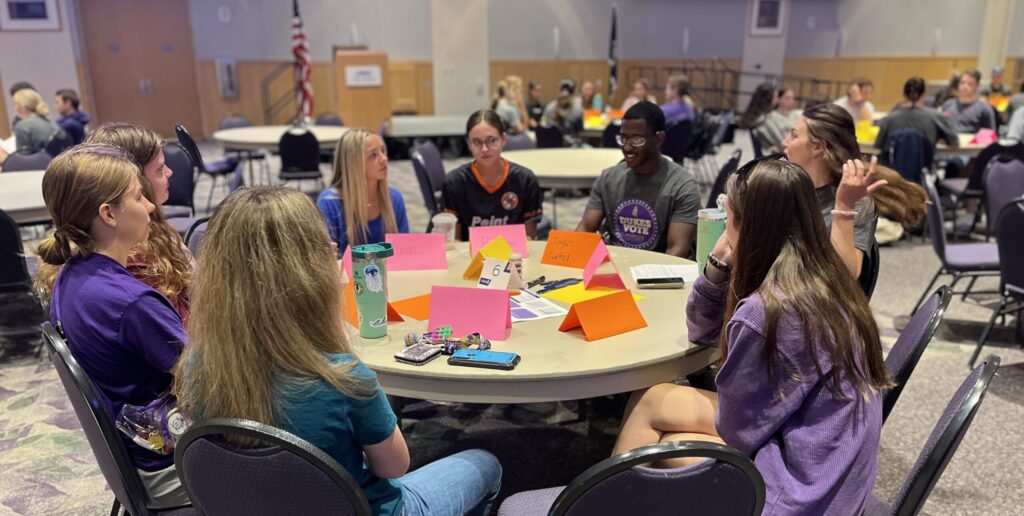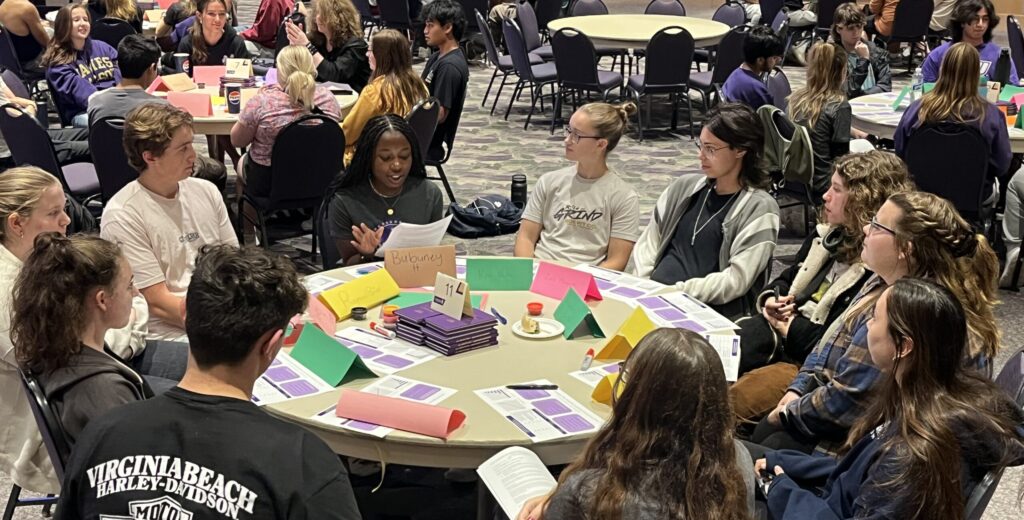Better Conversations Together: Preparing JMU Students for Active Citizenship

James Madison University (JMU) in Harrisonburg, Virginia, is fostering campus-wide civic learning by equipping every new student with skills to talk across differences. At JMU, the James Madison Center for Civic Engagement’s Better Conversations Together program is helping first-year students learn to deliberate – to listen well, consider tradeoffs, and find common ground on complex issues.
Better Conversations Together began as a cross-campus initiative of the Madison Center, designed to provide every incoming Duke with a research-informed experience in response to Virginia Governor Glenn Youngkin’s call for universities to establish student training on free speech and free expression. In answer to that call, the Madison Center team, led by Executive Director Dr. Kara Dillard, built on their previous successful work in deliberative pedagogy to create a pilot program for incoming first-year students. Better Conversations Together embeds deliberative dialogue as a core aspect of the freshmen experience and builds habits students can carry into classes, organizations, and the wider community.
It’s a model worth watching and adapting on any campus committed to preparing the next generation for active citizenship and engaged civic leadership.
A Campus-Wide Start: Foundations and the First-Year Experience
In 2024–2025, JMU piloted a full implementation and assessment of Better Conversations Together for all incoming first-year students. An ambitious step grounded in the university’s mission to educate “enlightened citizens.” The program is a two-part experience designed to meet students where they are and help them become the kind of neighbors, coworkers, and civic leaders our communities need.
Part I happens before students arrive. Using the Constructive Dialogue Institute’s Perspectives Program, students explore through brief online modules how people form beliefs, process information, and engage across differences. This shared foundation gives everyone a common language for what it means to disagree well—before they step into a room together. As the Center’s Program Manager, Aidan Heitt, explained, “So before the students even arrive on campus…they’re learning about the inner workings of their minds, how people form values and beliefs, and how our brains process information.” The goal is practical and human. “Students seem to really like it a lot, which is great,” Heitt added—because early buy-in opens the door to practicing habits of empathy, inquiry, and collaboration that are too rare in public life.
Part II puts learning into action. Shortly after arrival, students join small-group deliberative forums on real-world issues (like AI in the workplace or election integrity) using nonpartisan materials. The Madison Center uses NIFI’s proven model to provide an overview of the issue and frame possible approaches for addressing the problem in an accessible and relevant format for students. “Using NIFI’s nonpartisan issue guides ensures that our students, no matter their views, values or perspectives, can see themselves as part of the conversation. Nonpartisanship is deeply important to us, and the NIFI materials help us achieve that goal,” said Dillard.
In addition to nonpartisan discussion materials, neutral undergraduate peer moderators contribute to confidence and trust in the deliberative process for student participants. Democracy Fellow Ella Crangle described the neutral facilitator’s role plainly: “I can’t give my opinion…so I really do have to sit there and listen.”

Student Voices: What They See, Practice, and Carry Forward
Better Conversations Together isn’t about changing anyone’s core beliefs; it’s about changing how we talk with one another. Facilitators grow right alongside first-year students. Democracy Fellow Bubuney Havi reflected on the early learning curve: “The first time, it was a bit challenging, because [I’m] not supposed to… add my ideas, but just listen—and give people the space to chat and disagree with each other.” Over time, that posture of curiosity becomes contagious. “It was so interesting seeing how they just… disagreed, but then… came to a conclusion… without people arguing or storming off… If only people have that space to just [talk]. It was so nice seeing that.”
Crangle sees the shift in real time: “Those kinds of skills are huge.” She’s also become one of the program’s most joyful ambassadors: “I’m essentially a walking Madison Center advertisement.” Under the hood, the program intentionally cultivates four outcomes civic life demands: empathy and respect; intellectual openness; dialogue skills and confidence (including listening); and understanding and perspective-taking. Together, those habits not only prepare students for civic life, but they also carry over into how the students interact with others in class, in residence halls, and beyond.

Evidence, Iteration, and Why This Model Matters
Early results from the 2024–2025 pilot assessment are encouraging. Pre/post measures show a decrease in affective polarization, and students report increased openness to differing views alongside a better understanding of complex issues. In the forums themselves, 89% said their group fairly considered differing ideas; 83% felt more willing to engage in tough discussions; 78% said their views evolved through dialogue; and 80% reported their group found common ground and supported acting together on it. These results point to something bigger than a single program—they reflect a campus shaping deliberative citizens who can participate meaningfully in civic life.
Like any strong pilot, the program surfaced practical lessons for improvement. The Madison Center is focusing on clearer communication around the requirement to boost participation and response rates; refining assessment processes; embedding the concepts behind dialoguing across differences and pluralism more deeply in courses; and supporting faculty and student leaders (including Faculty Fellows in Collaborative Dialogue and Democracy Fellows) to extend the work across the curriculum. This work complements JMU’s broader civic infrastructure—like Dukes Vote, which engages students as deliberative voters through nonpartisan education and discussion—creating a campus climate where civic learning is expected, practiced, and celebrated.
The broader takeaway for other campuses is straightforward: JMU’s campuswide deliberation program offers a replicable, whole-campus approach to the core work of civic education—helping new students learn how to talk across differences and act together on what they can agree to do. As Heitt summed it up, Better Conversations Together helps students develop “21st-century skills that are vital for all aspects of life—[especially] civic life and life in the workforce.” The assessment shows those skills are taking root, and student voices show they’re sticking.

